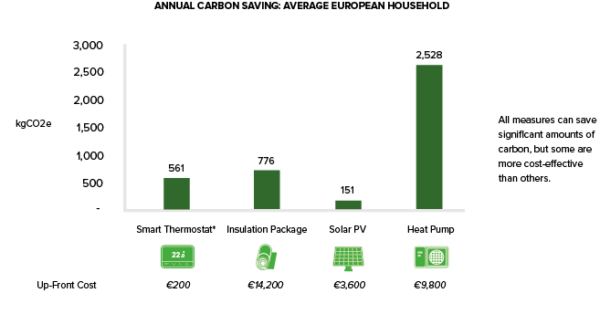Gemserv’s new report finds that smart thermostats are 10 times more cost effective per €100 spent at decarbonisation than the next best alternatives; solar PV, heat pumps and insulation.
Munich, 19 October 2021: With heating and cooling of homes accounting for 21% of the EU’s energy consumption, European housing stock urgently needs decarbonising in order to lower emissions 55% by 2030 and achieve net-zero1 according to a new report from Gemserv and tado°.
To realise these goals and reduce CO2 emissions, approximately €600 billion has been reserved in the EU’s Green Deal funds2. Decarbonisation is a huge challenge for governments across Europe, and any spending must be used as effectively and efficiently to not incur higher costs to the taxpayer.
A new report produced by research consultancy Gemserv looked at the four most common methods of decarbonising homes in Europe and found that compared to solar PV, heat pumps, and insulation, smart thermostats offered the most cost effective first step to decarbonisation based on the upfront cost and carbon saved.
On average a smart thermostat from tado° saves 22% of energy used in homes across Europe, based on data provided by over 1 million connected thermostats3. If all homes in Europe were equipped with smart thermostats, the total carbon emissions across Europe could fall by 4.75%, a sizeable contribution to the 55% goal by 2030.
According to tado°, the cost for implementing smart thermostats in all European homes would be approximately €40 billion, or 6.67% of the total cost allocated for the European Green Deal. To achieve the same 4.75% reduction in emissions through other infrastructure would be much more costly; the next best alternative heat pumps require ten times the investment at €432 billion, €2.25 trillion for insulation, solar PV being €2.81 trillion, sizeable portion of the EU’s investment funds.

The report also highlights that in order for the EU to achieve its targets for CO2 emissions these measures must work in tandem. Heat pumps, insulation and solar PV are all recognised methods of decarbonising for the future, and will each play an important role in achieving the net-zero goal of 2050. Heat pumps, solar PV, smart thermostats and insulation can all play a large role in decarbonising a single home together.
Christopher Lewis, Economic Analyst at Gemserv says,
“Intelligently controlled low carbon heating, renewable electricity generation, and insulation upgrades will all play a key role in household decarbonisation. However, this report demonstrates that smart thermostats offer consistent financial returns, whilst saving carbon – unique amongst the four technologies we have analysed.”

Christian Deilmann, Co-Founder and CPO of tado° the leader in intelligent home climate management says
“The European Green Deal needs to recognise these findings, and use their budget wisely to make a real difference on an international level. Smart thermostats clearly offer the most cost efficient use of taxpayer funds”
“If policymakers were to incentivise the uptake of smart thermostats as they have for other measures, homes would waste less energy and our net-zero target would be achieved much sooner and at lower cost.”
The report was peer reviewed by Dr. Tim Forman, Senior Research Associate, University of Cambridge who says
“Smart thermostats show compelling potential to reduce energy demand, thereby reducing energy-related carbon emissions, based on the study assumptions.”
With the low-barrier for entry, and ease of use, policymakers, governments and building regulators should recognise this study and bring about government incentives for smart thermostats in-line with the European Green Deal Renovation Wave and to better help foster smart thermostat’s up-take.
- To read the report please visit http://www.tado.com/Energy-Efficiency.
- For more information on Smart Thermostats and their benefits visit www.tado.com
Footnotes
1 Source: Decarbonisation of Heat: Why it Needs Innovation, 18 March 2020
2 Based on the planned One third of the 1.8 trillion euro investments from the NextGenerationEU Recovery Plan, not including the EU’s seven-year budget which will also finance the European Green Deal. Source: https://ec.europa.eu/info/strategy/priorities-2019-2024/european-green-deal_en
3 Average savings from over 1,000,000 connected thermostats, data provided by tado GmbH.
About Gemserv
Gemserv is an expert provider of professional services in a world driven by data and technology. It is a purpose-driven company, working across multiple sectors, including energy, the public sector and health to tackle today’s social and environmental challenges. The business provides consultancy and outsourcing capabilities to make markets work better, to help organisations harness the power of digital transformation and to ensure people’s data is better protected and used ethically.
About Dr. Tim Forman
Dr. Tim Forman (BA MSc PhD) is a Senior Research Associate at the Cambridge Institute for Sustainability Leadership, University of Cambridge. Dr Forman’s research, teaching and professional background relates to the design, construction and renovation of buildings and to improving sustainability and resilience in the built environment under current and future climate conditions.
About tado°
tado° is the European leader in intelligent home climate management. As the only cross-manufacturer platform, tado° Smart Thermostats and services connect with any kind of heating or cooling system. Customers benefit from energy-saving technology such as Geofencing and Open Window Detection, as well as from remote heating diagnostics. Founded in Munich, 2011, and with 180 employees, tado° reshapes the way energy is consumed for more comfort, savings, and wellbeing at home.


